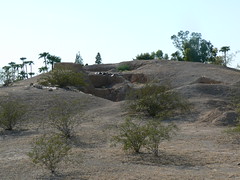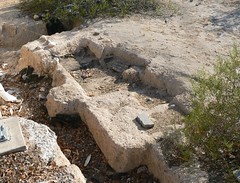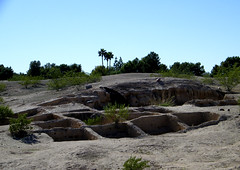Ancient Canals Discovered in Heart of Mesa
Destination Arizona
B. Thomas Cooper
Editor
Anthropologists, with the assistance of satellite imagery, have discovered the remains of a series of ancient canals, located just south of the Salt River, near the very heart of downtown Mesa, Arizona.
The existence of the canal system, built in the Salt River valley centuries ago by the Hohokam, has long been known, but the extent of this most recent discovery has caught some experts by surprise.
Jerry B. Howard, curator of anthropology at the Arizona Museum of Natural History is one of the experts involved in archaeological studies of the region being conducted before the city of Mesa can permit the area to be redeveloped. Planners had intended to build a massive water park on the property, but all bets are off as to whether that plan can still move forward.

Mesa Grande Pueblo Ruins
"Through satellite imagery, sometimes we can actually see the canals, kind of a signature of them," states Howard. "The soil in them is different than the other soil around them, more porous and moist.”
The area, larger in scope than previously anticipated, is currently home to a golf course and a hospital, the two of which are separated by not surprisingly, the Mesa Grande Pueblo ruins.
These ruins, located near the heart downtown Mesa, were once occupied by the Hohokam Indians, responsible for constructing massive canal systems, still providing water to the Valley of the Sun, hundreds of years after the Hohokam mysteriously vanished.
The Hohokam inhabited the northern Sonora desert region known as the ‘Phoenix Basin’ for centuries before the arrival of the European explorers. They constructed extensive canals and irrigation networks, rivaling those of Ancient Egypt and China. These industrious peoples cultivated a variety of crops, including tobacco, cotton, beans, squash, maize and agave.

Mesa Grande Pueblo Ruins
John Bartlett, Arizona pioneer, was one of the early explorers of the region to document the ruins at Mesa Grande, writing the following about his experience:
"(July 4, 1852) ...A ride of a mile brought us to the table-land, when we made for a large mound or heap which arose from the plain. In crossing the bottom we passed many irrigating canals; and along the base of the plateau was one from twenty to twenty-five feet wide, and from four to five feet deep, formed by cutting down the bank—a very easy mode of construction, and which produced a canal much more substantial than if carried across the bottom".

Mesa Grande Pueblo Ruins
"On reaching the great pile, I found it to be the remains of an adobe edifice from two hundred to two hundred and twenty-five feet in length, by from sixty to eighty feet wide, its sides facing the cardinal points. Portions of the wall were visible in only two places, one near the summit, at the south end, where, from the height of the pile, it must have originally been three or four stories high; and the other at the northern extremity, on the western side...From the summit of the principle heap, which is elevated from twenty to twenty-five feet above the plain, there may be seen in all directions similar heaps; and about a mile to the east, I noticed a long range of them running north and south, which the Indians said were of similar character to that on which we stood."
Today, little of the Mesa Grande Pueblo remains. A fence has been erected around the perimeter of the ruins, and not much can be seen from the roadway. Few residents in the neighborhood are even aware of the ruin’s existence. A sad state of affairs for a culture responsible for so much innovation. Without the canals, the valley would have remained uninhabitable.
Destination Arizona
Destination Arizona
Labels: Arizona History, B. Thomas Cooper, destination arizona, Hohokam, Mesa Grande, pueblo indians

![Validate my Atom 1.0 feed [Valid Atom 1.0]](http://feedvalidator.org/images/valid-atom.png)

0 Comments:
Post a Comment
<< Home